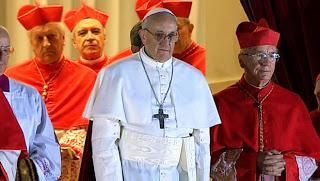
At National Catholic Reporter, Colman McCarthy asks whether Catholics blown out of the church in recent decades by "a strong tailwind of reasons" should return now that Francis is pope:
It was a strong tailwind of reasons that helped blow us out the door: revulsion at the child abuse scandals, the hierarchy's shielding of pedophile priests, the cruelty of church policy on gays and lesbians, the Vatican's clamping down on American nuns, the attacks on priests who support women's ordination, a calcified Eurocentric Roman bureaucracy that rules by fiat and not consensus. Then, too, a final turn-off: doctrinal rigidity. Rome has spoken; that's it, people. No discussion allowed.
There's a chance for reassessment, McCarthy thinks, if Francis proves to be not a tinkerer, but an overhauler akin to John XXIII. And, if Francis does follow in John XXIII's footsteps, he could (and perhaps should) call a third Vatican Council, which should do the following, McCarthy proposes:
Go to confession collectively, for a sacramental start. Confess to the sin of harassing the American nuns, a group of women who without their unsung and free labor in hospitals, schools and service in the outposts of compassion, the church couldn't function. Confess to the sin of stonewalling the appeals of the pedophile victims. Confess to the sin of expelling Fr. Roy Bourgeois from the priesthood and invite him back to the fold. Confess to the sin of demeaning gays and lesbians, with Francis himself apologizing for saying as recently as 2010 that same-sex marriage is "a war against God" and "a maneuver by the devil."
A Third Vatican Council, with the laity having equal status with the hierarchy, could become the collagen that keeps together the essentials of the faith while allowing the nonessentials -- priestly celibacy, male-only clergy, no contraception -- to be relegated to history as was the Latin Mass, meatless Fridays and no altar girls. With a pope named Francis, it could be a moment for the church to collectively clear its head by embracing the pacifism of St. Francis of Assisi and finally do away with blessing just wars. It could be a moment for Pope Francis to embrace the saint's love of animals by calling for an end to the daily horrors of factory farming and instructing Catholics to respect the rights of animals by becoming vegans.
As I said recently, I doubt seriously that many disaffected and alienated Catholics will return to the church under Francis, no matter what kind of new leadership he might give to the church. We won't return to the church as it's presently configured, that is.
If the last several weeks have taught me any lesson at all, they've taught me all over again and very decisively that I want to keep a clear and pronounced distance between myself and an institution (as opposed to a group of people) that can energize the kind of outright hatred I see now on full display again in some Catholic circles vs. gay and lesbian human beings. I want nothing to do with an institution (again, I separate the Catholic institution from the Catholic people) that can not only foster but protect and disseminate this kind of outright hatred, never challenging it and never calling gay-bashing Catholics to the same accountability to which the institution calls, say, Catholics who are pro-choice or pro-marriage equality.
Institutions that foster and protect this kind of behavior are very low on the scale of human moral development and don't deserve support. They deserve to fall apart--as soon as possible, rather than by dribs and drabs, because of the number people they are hurting with their moral sliminess, with their moral obtuseness.
And so I don't see many disaffected and alienated Catholics like me returning to the Catholic church qua institution under Francis. I do, however, agree with Leonardo Boff when he says that, if Francis portends a third-millennium reconfiguration of how the Catholic institution does business, then many disaffected and alienated Catholics may find ourselves able once again to find places within that reconfigured institution.
An institution that would have many different faces in many different cultural settings, finding its unity not primarily in structures imposed top-down and authoritatively, but in the lived, shared experience of Catholic life configured around the gospel, in communities of praxis that will have very different contours and structures according to the cultures in which they plant themselves. In communities with lay leadership and structures of priestly ministry arising out of the lay heart of the church, structures that would comprise women priests and married priests, as well as openly gay ones.
I also fully agree with Colman McCarthy that the very first--and imperative--step the current leadership of the Catholic church has to take to set the church on the road to that kind of effective reform is to confess. Collectively. To confess for the egregious institutional sins that McCarthy clearly identifies.
This was the point of one of my very first statements about the new pope, in fact. As I noted in that statement, in my view, the most important thing Francis can do as pope is to set the Catholic hierarchy on a path of kenotic atonement by an open, public, and, honest confession that the institutional church has sinned grievously in its response to abuse survivors, women, the poor, theologians, and gays and lesbians under the last two papacies.
Will Francis take these steps? I doubt it. But I'll wait and see. And hope is not something I ever give up very willingly, even when I find hope extremely difficult.
The photo is a photo by Peter Macdiarmid of Pope Francis with some of the cardinals elector following the announcement of his election; it's from the CBS news site.

